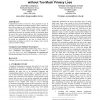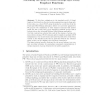1612 search results - page 309 / 323 » About models of security protocols |
SAC
2004
ACM
14 years 1 months ago
2004
ACM
Computational models of trust have been proposed for use in ubicomp environments for deciding whether to allow customers to pay with an e-purse or not. In order to build trust in ...
SAC
2004
ACM
14 years 1 months ago
2004
ACM
Next generation mobile devices will allow users to share and pass information within anonymous groups of people in an ad hoc manner. This will smooth the path for many kinds of ne...
OOPSLA
2004
Springer
14 years 1 months ago
2004
Springer
This paper presents the design of G, a new language specifically created for generic programming. We review and identify important language features of C++ and Haskell in light o...
ACNS
2010
Springer
14 years 1 months ago
2010
Springer
To this day, realizations in the standard-model of (lossy) trapdoor functions from discrete-log-type assumptions require large public key sizes, e.g., about Θ(λ2 ) group elements...
COMPSEC
2002
13 years 8 months ago
2002
In this paper an insider attack is considered to be deliberate misuse by those who are authorized to use computers and networks. Applying this definition in real-life settings to ...


